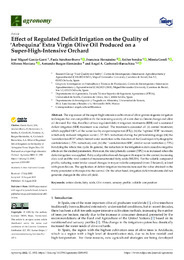Título :
Effect of Regulated Deficit Irrigation on the Quality of ‘Arbequina’ Extra Virgin Olive Oil Produced on a Super-High Intensive Orchard |
Autor :
García Garví, José Miguel
Sánchez Bravo, Paola
Hernández, Francisca
Sendra, Esther
Corell, Mireia
Moriana, Alfonso
Burgos Hernández, Armando
Carbonell Barrachina, Ángel A. |
Editor :
MDPI |
Departamento:
Departamentos de la UMH::Tecnología Agroalimentaria |
Fecha de publicación:
2022-08 |
URI :
https://hdl.handle.net/11000/38481 |
Resumen :
The expansion of the super-high-intensive cultivation of olive groves requires irrigation
techniques that are compatible with the increasing scarcity of water due to climate change and olive
oil demand. For this, the effect of two regulated deficit irrigation treatments (RDI) and a sustained
deficit irrigation (SDI) treatment was studied. The treatments consisted of: (i) control treatment,
which supplied 100% of the water lost by evapotranspiration (ET0
); (ii) the “optimal RDI” treatment,
which only reduced irrigation water (~37–54% reduction) during the pit hardening stage; (iii) the
“confederation RDI” which limited water restriction to the donation of the Guadalquivir hydrographic
confederation (~72% reduction); and, (iv) the “confederation SDI”, similar water restriction (~72%)
but dying the whole tree cycle. In general, the reduction in the irrigation water caused no negative
effects on the studied parameters. However, the total phenolic content (TPC) was increased when the
deficit irrigation was applied. Fatty acid profile showed changes with respect to the control, increasing
oleic acid and the total content of monounsaturated fatty acids (MUFA). For the volatile compound
profile, reducing water intake caused changes in mayor volatile compound (trans-2-hexenal), related
with green flavors. The application of deficit irrigation treatments increased the value obtained in the
fruity parameter with respect to the control. On the other hand, irrigation deficit treatments did not
generate changes in the olive oil yield.
|
Palabras clave/Materias:
antioxidants
fatty acids
Olea europea
sensory profile
volatile composition |
Tipo de documento :
info:eu-repo/semantics/article |
Derechos de acceso:
info:eu-repo/semantics/openAccess
Attribution-NonCommercial-NoDerivatives 4.0 Internacional |
DOI :
https://doi.org/10.3390/agronomy12081892 |
Publicado en:
Agronomy 2022, 12(8), 1892; |
Aparece en las colecciones:
Artículos Tecnología Agroalimentaria
|
 La licencia se describe como: Atribución-NonComercial-NoDerivada 4.0 Internacional.
La licencia se describe como: Atribución-NonComercial-NoDerivada 4.0 Internacional.
.png)
